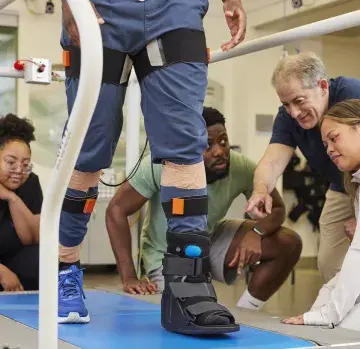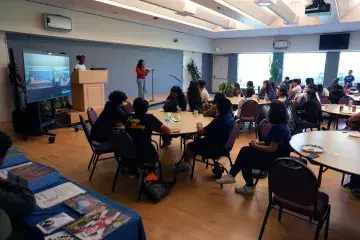Civil Rights Icon Dolores Huerta Inspires, Challenges SMU Students
 Dolores Huerta, the 85-year-old civil rights icon, stood inside Samuel Merritt University’s (SMU) Bechtel Hall in Oakland on Thursday night and pumped her fist into the air as if she were leading a rally in 1965. (See the events photos here.)
Dolores Huerta, the 85-year-old civil rights icon, stood inside Samuel Merritt University’s (SMU) Bechtel Hall in Oakland on Thursday night and pumped her fist into the air as if she were leading a rally in 1965. (See the events photos here.)
“Viva Cesar Chavez!”
The crowd of 130 students and faculty shouted it back to Huerta.
“Viva Martin Luther King!”
The audience responded.
“Viva healthcare workers!”
The crowd roared again.
Huerta, who traveled from her home in Stockton to speak at SMU as part of the Hispanic Heritage Month celebration,  delivered a fiery and inspired sermon that called on future healthcare providers to serve with compassion and help overhaul the inequalities created by the U.S. healthcare system.
delivered a fiery and inspired sermon that called on future healthcare providers to serve with compassion and help overhaul the inequalities created by the U.S. healthcare system.
“We’ve got to get civically involved and engaged,” Huerta said. “We have to make politicians accountable, so they put the money where they need it. So please vote, and vote for the progressive candidates who will help make us a healthier society for all.”
Patricia Gomez, a Bachelor of Science in Nursing (BSN) student, told a visiting reporter from Oakland North that she was inspired by Huerta’s dedication to the working poor, and would one day like to work in an underserved community.
“Huerta is a role model for students of color like myself,” Gomez said, “and for students who are seeking to continue empowering our underrepresented community.”
 Huerta’s visit also coincided with the University’s second Community Reads Initiative, the year-long, campus-wide, shared reading of an important book that challenges all to consider the inequities in healthcare. This year, SMU is reading “Fresh Fruit, Broken Bodies: Migrant Farmworkers in the United States,” by Seth Holmes, an assistant professor of health and social behavior at UC Berkeley.
Huerta’s visit also coincided with the University’s second Community Reads Initiative, the year-long, campus-wide, shared reading of an important book that challenges all to consider the inequities in healthcare. This year, SMU is reading “Fresh Fruit, Broken Bodies: Migrant Farmworkers in the United States,” by Seth Holmes, an assistant professor of health and social behavior at UC Berkeley.
“Dolores Huerta’s courage as an activist and organizer serves as inspiration to our future healthcare professionals,” said Shirley Strong, chief diversity officer at SMU. “As healthcare providers we often talk about getting healthy by eating fruits and vegetables, but we do not want our health to come at the cost of exploiting others.”
Before addressing the crowd, Huerta met privately with two dozen Latino and Latina students and faculty for a more intimate round table discussion.
 “SMU students asked me, ‘What can I do right away to make a positive change?’” Huerta said. “I told them you can always work on legislation and sign people up to vote.”
“SMU students asked me, ‘What can I do right away to make a positive change?’” Huerta said. “I told them you can always work on legislation and sign people up to vote.”
Huerta shared memories from her time as the cofounder of the National Farm Workers Association with Cesar Chavez, which aimed to bring basic labor rights to field workers and raise the profile of the injustices against the workers.
Huerta helped establish three critical pieces of California state legislation that improved healthcare for farmworkers: disability insurance, worker’s compensation, and unemployment payments.
In 49 other states, farmworkers are not entitled to those basic labor services, Huerta said. “That’s because the farmworkers in the 49 other states aren’t organized,” she added. “That’s why it’s important to organize, gain strength in numbers, and change the laws to improve lives.”
Huerta told her audience it was critical to serve migrant farmworkers, who often go without proper health assistance and work in deadly heat and breathe in toxic pesticides.
“We know that undocumented people in our society are taken advantage of,” Huerta said. “We know our society takes advantage of those who can’t protect themselves. That’s why I call on yo u to help them.”
u to help them.”
Huerta also pointed to mental health issues among farmworkers that have gone overlooked and unaddressed since the closure of federal facilities in the 1980s that specialized in treating such patients. Huerta, whose eldest son is a medical doctor, said socialist countries delivered better and less expensive healthcare to their citizens — something she’d like to see in the U.S.
“We need to look and see what they are doing right and what we are doing wrong,” Huerta said. “We can’t think some miracle is going to make all these bad things go away. We have to take responsibility and make sure they get changed. We don’t have to feel helpless; we’re the ones who have the power.”
For more photos from the event, visit our Flickr album here.


